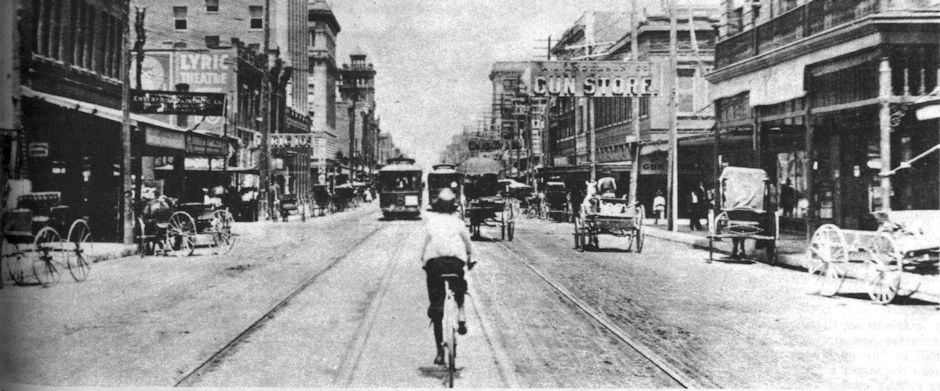The year 1895 was a twofer for Fort Worth in sports.
The Fort Worth Panthers baseball team, like the Texas League it played in, had been organized in 1888. The first few years of the team and the league were uneven, with both team and league disbanding more than once. The Panthers never finished a season higher than fifth place.
But in 1895 the Panthers were part of a new league: the Texas-Southern League. And with a new year and a new league, hope sprang eternal.
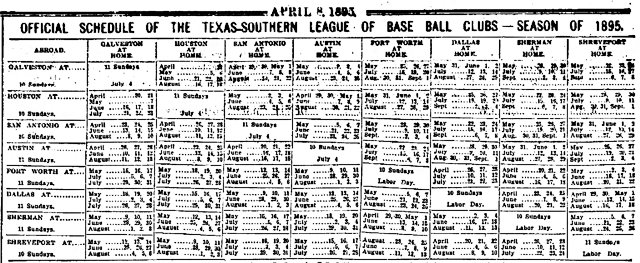 The Texas-Southern League was a short-lived class B minor league made up of teams in eight cities. All but Shreveport were Texas cities.
The Texas-Southern League was a short-lived class B minor league made up of teams in eight cities. All but Shreveport were Texas cities.
The league played a two-half season: A winner of the first half would meet the winner of the second half in a playoff series to determine the league championship for the season. If one team won both halves, there would be no series.
The Panthers that year were managed first by T. P. Richards and then William H. Ward, who owned the White Elephant saloon.
The team’s home field was T&P Park near the railroad reservation.
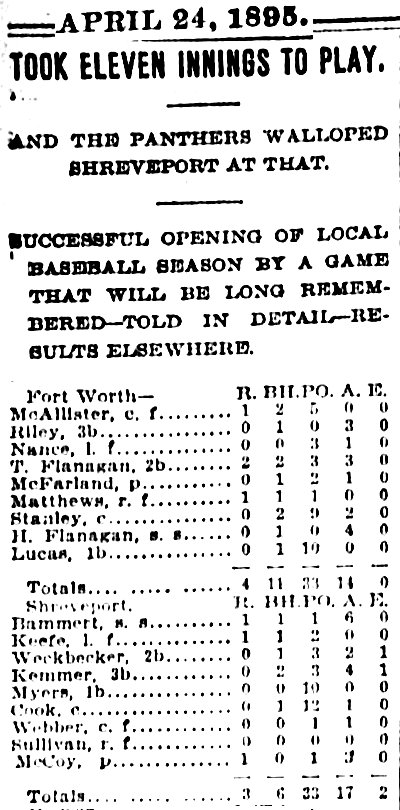 For the Panthers’ season opener on April 23, a Tuesday, three hundred fans snuck away from work to root, root, root for the home team. The Gazette reported that the team’s play was “sharp, clean and steady” with “not the slightest shadow of an error” as the Panthers beat Shreveport 4-3 in eleven innings.
For the Panthers’ season opener on April 23, a Tuesday, three hundred fans snuck away from work to root, root, root for the home team. The Gazette reported that the team’s play was “sharp, clean and steady” with “not the slightest shadow of an error” as the Panthers beat Shreveport 4-3 in eleven innings.
Predictably, the ongoing rivalry between the cities of Fort Worth and Dallas extended to the baseball diamond. Newspapers in each town sniped at the manager, players, and fans of the other team.
Each town relished each win over the other town and bemoaned each loss.
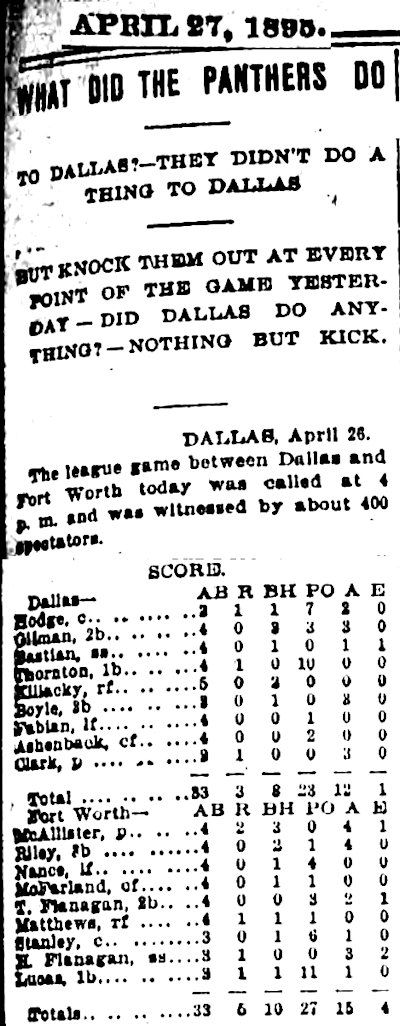 For example, the Gazette crowed when the Panthers beat the Dalls Steers 5-3 on April 26. Note the headlines “Did Dallas Do Anything? Nothing But Kick.” The Gazette loved to accuse the Dallas team of “kicking” (complaining).
For example, the Gazette crowed when the Panthers beat the Dalls Steers 5-3 on April 26. Note the headlines “Did Dallas Do Anything? Nothing But Kick.” The Gazette loved to accuse the Dallas team of “kicking” (complaining).
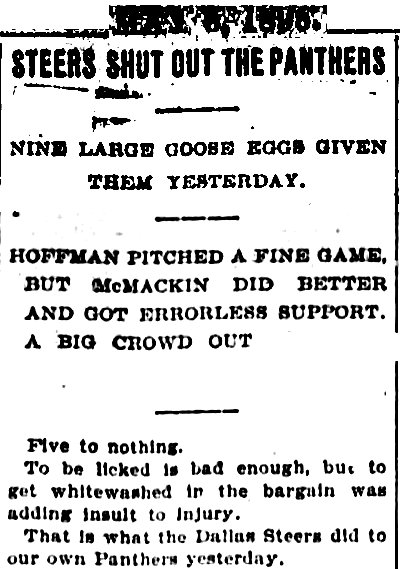 But on May 5 there was no joy in Pantherville as Dallas shut out Fort Worth, “adding insult to injury.”
But on May 5 there was no joy in Pantherville as Dallas shut out Fort Worth, “adding insult to injury.”
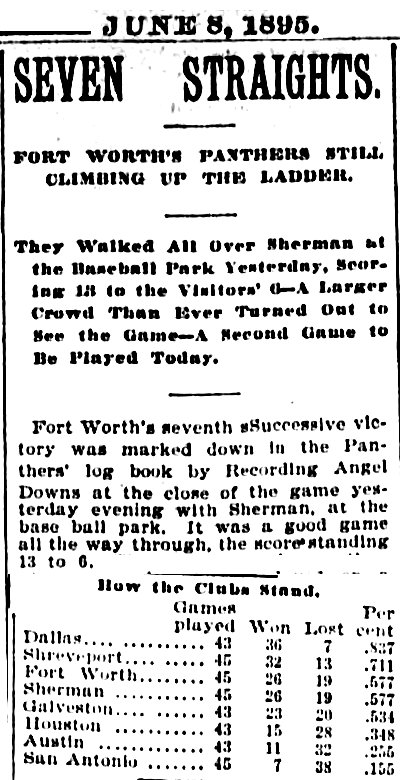 On June 8 the Panthers were in third place after winning seven in a row. Their downriver rivals were comfortably in first place. In June William H. Ward took over as manager of the Panthers.
On June 8 the Panthers were in third place after winning seven in a row. Their downriver rivals were comfortably in first place. In June William H. Ward took over as manager of the Panthers.
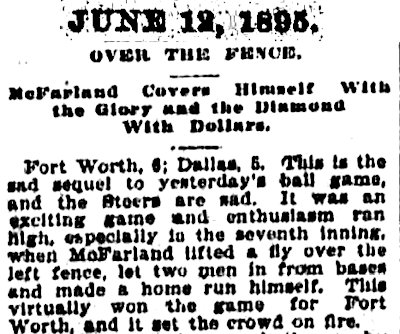 When Panthers outfielder Monte McFarland hit a game-tying home run against the Steers on June 11, appreciative Panthers fans threw dollars and half-dollars totaling about $40 ($1,200 today) onto the field as he crossed home plate.
When Panthers outfielder Monte McFarland hit a game-tying home run against the Steers on June 11, appreciative Panthers fans threw dollars and half-dollars totaling about $40 ($1,200 today) onto the field as he crossed home plate.
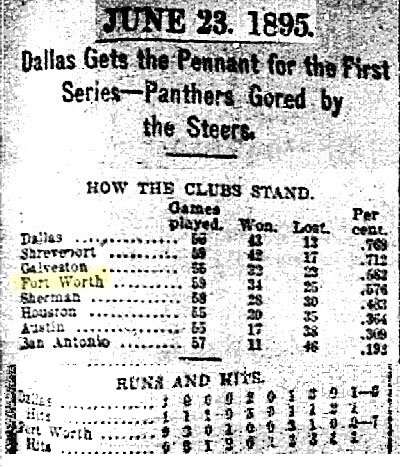 “Panthers Gored by the Steers”: On June 22 Dallas won the first half of the season, beating Fort Worth 8-7 in Dallas as Fort Worth Mayor B. B. Paddock watched. The Panthers finished the first half in fourth place.
“Panthers Gored by the Steers”: On June 22 Dallas won the first half of the season, beating Fort Worth 8-7 in Dallas as Fort Worth Mayor B. B. Paddock watched. The Panthers finished the first half in fourth place.
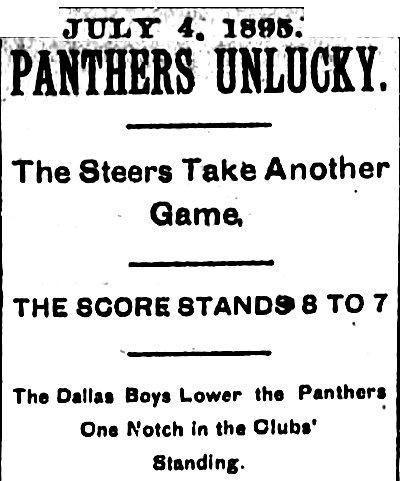 On July 3 Dallas beat Fort Worth again as the second half of the season got under way.
On July 3 Dallas beat Fort Worth again as the second half of the season got under way.
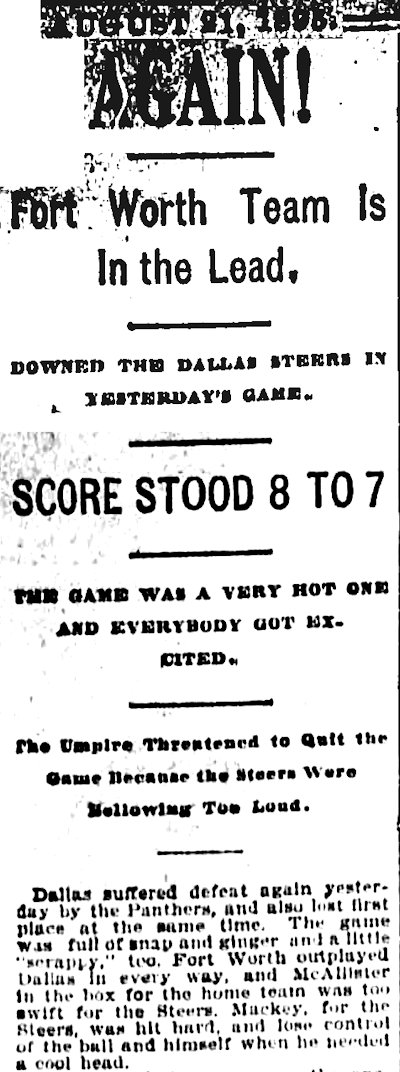 But when the Panthers beat Dallas on August 20, Fort Worth replaced Dallas at the top of the league standings.
But when the Panthers beat Dallas on August 20, Fort Worth replaced Dallas at the top of the league standings.
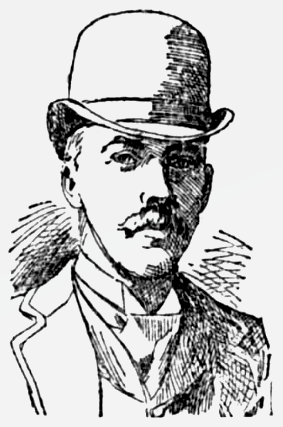 The Gazette wrote: “Dallas suffered defeat again yesterday by the Panthers and also lost first place at the same time. The game was full of snap and ginger and a little ‘scrappy,’ too. . . . About the middle of the game Mr. Mace left the diamond and refused to further umpire the game on account of the foolish and unwarranted ‘kick’ from the aggregation from the forks of the Trinity [Dallas], and it was only on the assurance of the captain of the Dallas team that the Steers would play more ball and kick less, that he consented to finish the game. Mr. [Ted] Sullivan [Steers manager, pictured] should certainly realize from his experience in Dallas that his team will be a poor drawing card if they continue to practice their dirty tricks and act as hoodlums instead of gentlemanly ball players.” (Image from Wikipedia.)
The Gazette wrote: “Dallas suffered defeat again yesterday by the Panthers and also lost first place at the same time. The game was full of snap and ginger and a little ‘scrappy,’ too. . . . About the middle of the game Mr. Mace left the diamond and refused to further umpire the game on account of the foolish and unwarranted ‘kick’ from the aggregation from the forks of the Trinity [Dallas], and it was only on the assurance of the captain of the Dallas team that the Steers would play more ball and kick less, that he consented to finish the game. Mr. [Ted] Sullivan [Steers manager, pictured] should certainly realize from his experience in Dallas that his team will be a poor drawing card if they continue to practice their dirty tricks and act as hoodlums instead of gentlemanly ball players.” (Image from Wikipedia.)
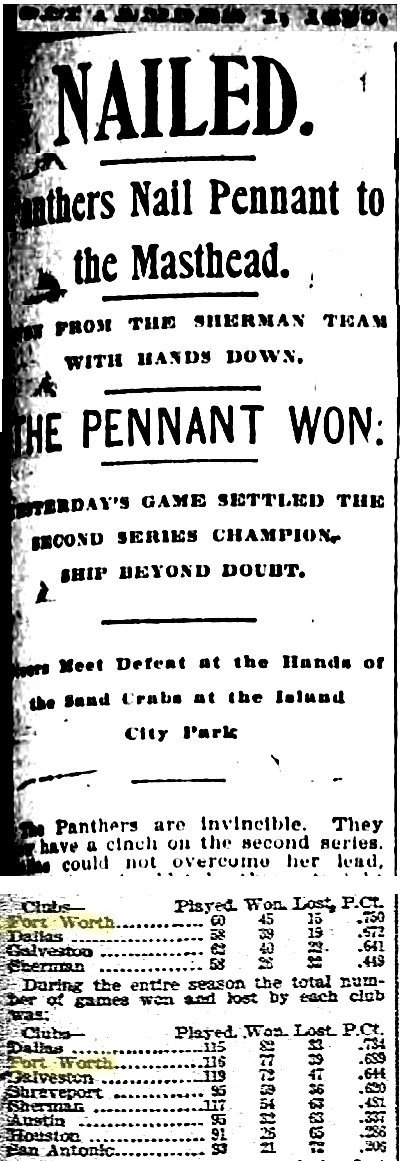 On August 31 the “invincible” Panthers won the second half of the season to “nail pennant to the masthead” with a 60-45 record, although Dallas had won more games during the entire season. Fort Worth and Dallas would meet in a playoff series to determine the overall 1895 champion.
On August 31 the “invincible” Panthers won the second half of the season to “nail pennant to the masthead” with a 60-45 record, although Dallas had won more games during the entire season. Fort Worth and Dallas would meet in a playoff series to determine the overall 1895 champion.
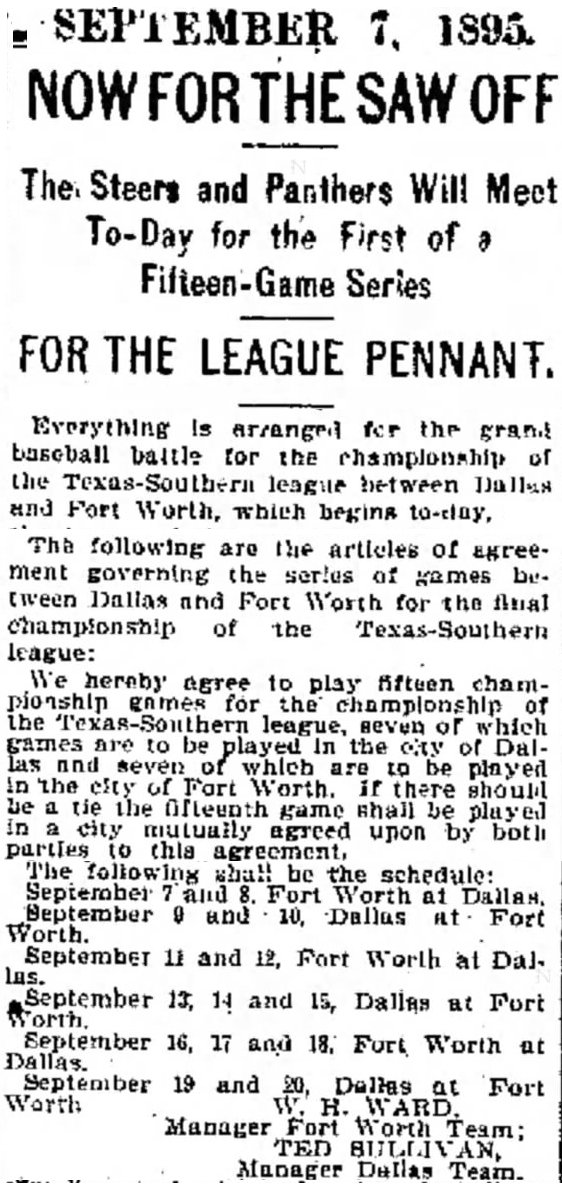 Managers Ward and Sullivan agreed to play a best-of-fifteen series. Each town would host seven games, with the fifteenth game to break a 7-7 tie if necessary.
Managers Ward and Sullivan agreed to play a best-of-fifteen series. Each town would host seven games, with the fifteenth game to break a 7-7 tie if necessary.
 But on September 7, the day when the first game was to be played in Dallas, a storm prevented the Panthers from boarding their train to Dallas. Manager Ward even tried to charter a special train but to no avail. Sullivan, informed that the Panthers could not get to Dallas on time, had his team and an umpire—who was not one of the two umpires agreed upon by Ward and Sullivan to officiate the playoff series—take the field in Dallas. Sullivan told his pitcher to throw nine balls over the plate, and the umpire declared that Dallas had won the game 9-0!
But on September 7, the day when the first game was to be played in Dallas, a storm prevented the Panthers from boarding their train to Dallas. Manager Ward even tried to charter a special train but to no avail. Sullivan, informed that the Panthers could not get to Dallas on time, had his team and an umpire—who was not one of the two umpires agreed upon by Ward and Sullivan to officiate the playoff series—take the field in Dallas. Sullivan told his pitcher to throw nine balls over the plate, and the umpire declared that Dallas had won the game 9-0!
The Gazette headlines indicate how Panthers fans roared thirty miles upriver.
The Gazette wrote: “The public at last discovers . . . how small and unfair . . . Ted Sullivan really is. . . . Mr. Sullivan undoubtedly is of the opinion that the ‘Beefs’ he presides over as manager have no possible show of carrying off the pennant and intends to resort to means, whether fair or unfair, to gain the end he has in view. . . . If Ted’s ears did not tingle last night it was no fault of Fort Worth friends of the Panthers, for he was certainly most heartily execrated.”
Ward vowed to protest Sullivan’s action with league officials.
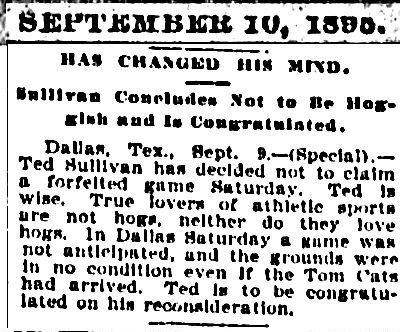 But Ted Sullivan changed his mind, decided not to claim a win in the game-that-wasn’t, and the Gazette congratulated him on not being “hoggish.”
But Ted Sullivan changed his mind, decided not to claim a win in the game-that-wasn’t, and the Gazette congratulated him on not being “hoggish.”
But two weeks later the game-that-wasn’t would affect the outcome of the playoff series as once again Ted Sullivan would change his mind.
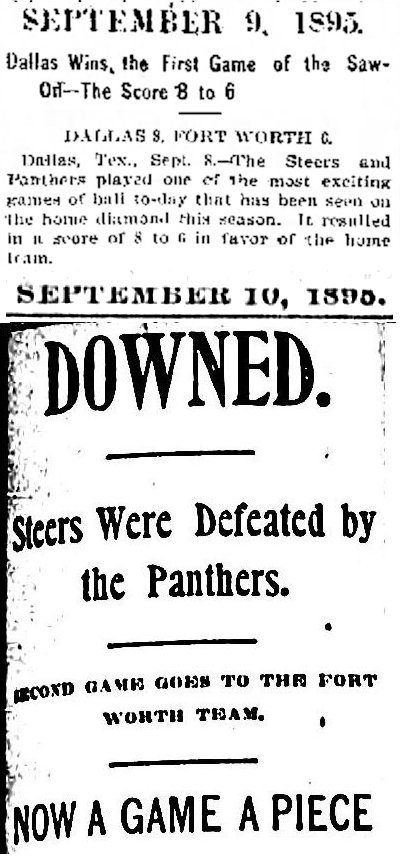 Game 1, September 8. In the first playoff game played with both teams on the field, Dallas won 8-6 before “upward of 2,000” spectators.
Game 1, September 8. In the first playoff game played with both teams on the field, Dallas won 8-6 before “upward of 2,000” spectators.
Game 2, September 9. Fort Worth won 2-1, tying the series at 1-1.
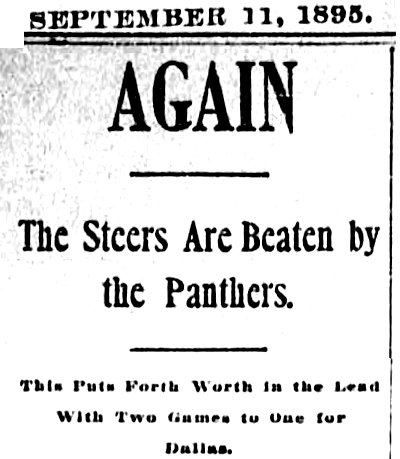 Game 3, September 10. Fort Worth won 4-3 and took a 2-1 lead in the series.
Game 3, September 10. Fort Worth won 4-3 and took a 2-1 lead in the series.
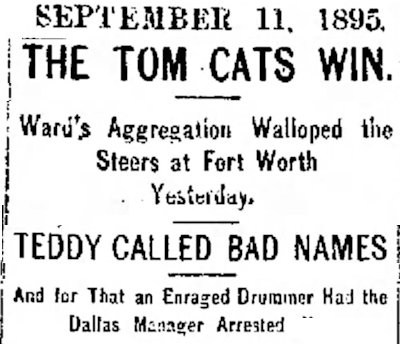 After the game, as Dallas manager Sullivan was going to the Fort Worth train station to return to Dallas, an “enraged drummer” (traveling salesman) attacked Sullivan with his fists after, the drummer claimed, Sullivan called him “bad names.” Both men were arrested, but Fort Worth manager Ward agreed to pay any fine levied against Sullivan, and Sullivan was released to return to Dallas.
After the game, as Dallas manager Sullivan was going to the Fort Worth train station to return to Dallas, an “enraged drummer” (traveling salesman) attacked Sullivan with his fists after, the drummer claimed, Sullivan called him “bad names.” Both men were arrested, but Fort Worth manager Ward agreed to pay any fine levied against Sullivan, and Sullivan was released to return to Dallas.
Game 4, September 11. Dallas won 7-4.
Game 5, September 12. Dallas won 9-7.
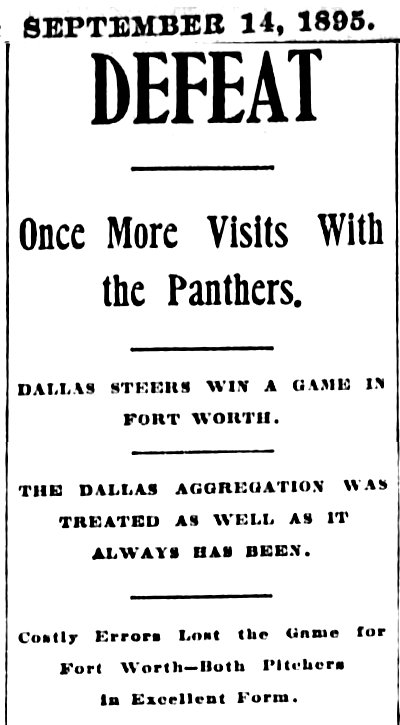 Game 6, September 13. Dallas won 5-3. Dallas had won three in a row, leading the series 4-2.
Game 6, September 13. Dallas won 5-3. Dallas had won three in a row, leading the series 4-2.
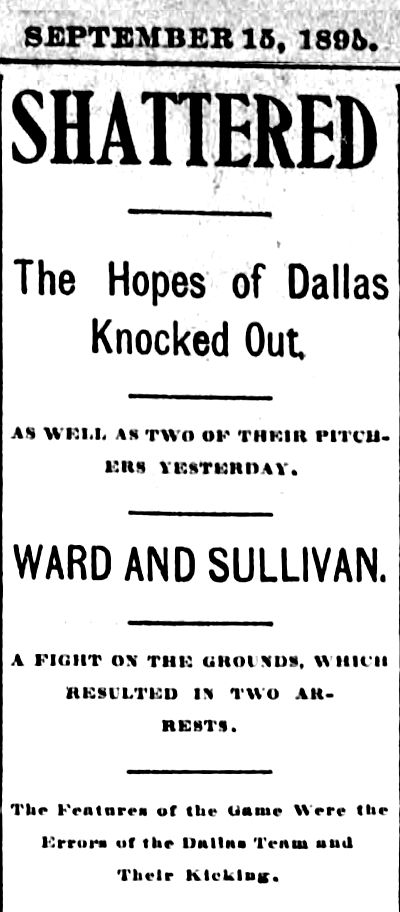 Game 7, September 14. Fort Worth won 9-6. The Gazette again alluded to the Steers “kicking.”
Game 7, September 14. Fort Worth won 9-6. The Gazette again alluded to the Steers “kicking.”
The headlines “Ward and Sullivan” and “A Fight on the Grounds, Which Results in Two Arrests” refer not to managers William H. Ward and Ted Sullivan but rather to Charlie Ward (William’s brother) and John Sullivan, a Fort Worth street department worker, who were arrested for fighting on the grounds.
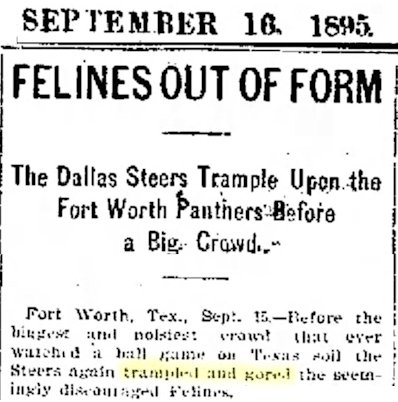 Game 8, September 15. Dallas won 9-5. The Galveston newspaper reported that the “biggest and noisiest crowd that ever watched a ball game on Texas soil” saw the Panthers “trampled and gored” by the Steers. Panther leftfielder Elsey suffered a broken jaw when he was hit by a pitch. He would miss the rest of the playoffs. When Panther rightfielder Kid Nance was batting with the bases loaded, Fort Worth fans protested the balls and strikes called by umpire Mace to the point that Mace had to be given “protection.”
Game 8, September 15. Dallas won 9-5. The Galveston newspaper reported that the “biggest and noisiest crowd that ever watched a ball game on Texas soil” saw the Panthers “trampled and gored” by the Steers. Panther leftfielder Elsey suffered a broken jaw when he was hit by a pitch. He would miss the rest of the playoffs. When Panther rightfielder Kid Nance was batting with the bases loaded, Fort Worth fans protested the balls and strikes called by umpire Mace to the point that Mace had to be given “protection.”
Game 9, September 16. Fort Worth won 6-2.
Game 10, September 17. Dallas won 7-4. The Panthers were down in the series 6-4 with five to play.
Game 11, September 18. Fort Worth won 6-3.
Game 12, September 19. Fort Worth won 11-4 The Panthers had evened the series 6-6 with three to play.
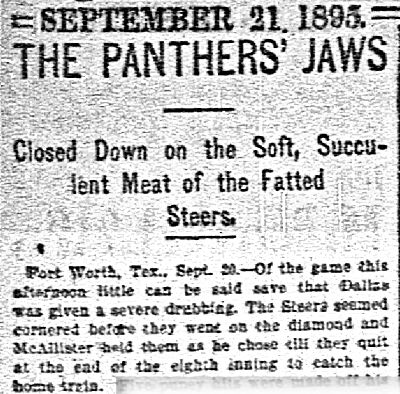 Game 13, September 20. Fort Worth won 8-1. The Panthers had won three games in a row to pull ahead in the series 7-6 with two to play.
Game 13, September 20. Fort Worth won 8-1. The Panthers had won three games in a row to pull ahead in the series 7-6 with two to play.
“The Panthers’ Jaws Closed Down on the Soft, Succulent Meat of the Fatted Steers.” Mercy! Believe it or not, this headline is from the Dallas, not Fort Worth, newspaper. In fact, the Steers quit the game after eight innings in order to catch the train back to Dallas.
There was even a rumor that the Steers might quit more than just game 13. The Gazette wrote: “Ted and his bovines departed for home beaten and crestfallen, out of luck and ditto in spirit. It was rumored on the streets last night that the Dallas ‘herd’ would not meet the Tom Cats in battle royal again, claiming that they did not meet with fair treatment from the umpire and public. But the treatment he [Sullivan] has received on the Fort Worth grounds cannot be well compared to the injury and insults heaped upon the Fort Worth club in Dallas by the members of the Dallas club, assisted by the ‘rooters’ and supposed peace officers of that city.”
The Dallas Morning News wrote: “Unless the Steers return [to Fort Worth] tomorrow, the games are ended. All Fort Worth backs Manager Ward in his determination to hold Sullivan to his agreement to play here tomorrow. This town wants the pennant and wants it bad.’
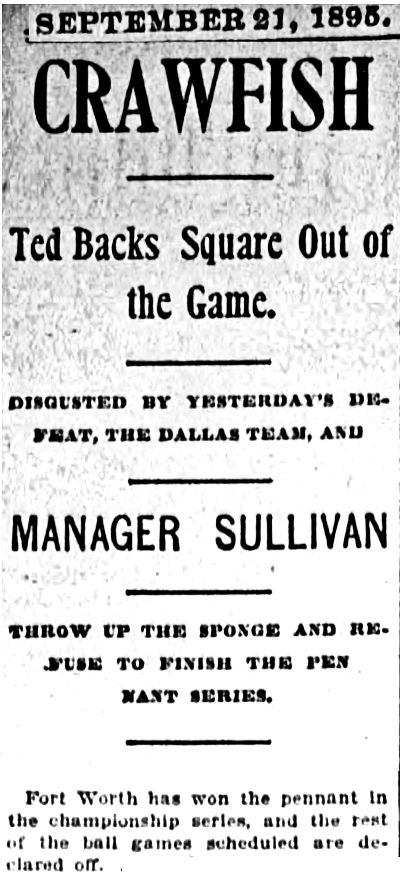 Sure enough, even though Dallas still could tie the series 7-7 in game 14 and force a game 15 and win the championship, manager Sullivan announced that he would not take his team to Fort Worth to play game 14 as stipulated by the agreement he and Ward had signed.
Sure enough, even though Dallas still could tie the series 7-7 in game 14 and force a game 15 and win the championship, manager Sullivan announced that he would not take his team to Fort Worth to play game 14 as stipulated by the agreement he and Ward had signed.
So, the Gazette announced that the Panthers had won the pennant—their first league championship.
Two weeks earlier the Gazette had lauded Sullivan for changing his mind and not being “hoggish” by claiming a win for Dallas in the game-that-wasn’t. But now the Gazette called him a “crawfish” for backing out of his agreement to play game 14 in Fort Worth.
Sullivan argued that because his team had lost the advantage of playing the first game in Dallas on the Steers’ home field, game 14 should be played in Dallas. Ward declined. Game 14 is to be played in Fort Worth, he insisted. Sullivan declined. Ward stood his ground. The Panthers won on the field seven games to six and, despite more “kicking” from Dallas, later won in the board room: League officials agreed that the Panthers were the champions.
And the Panthers had won with small ball: According to season statistics published by the Dallas Morning News, the Panthers led in nary an offensive or defensive category. The best offensive and defensive team statistically?
The Steers.
Kick about that, Dallas.
But wait! I promised an 1895 twofer:
1895: Cowtown’s Twofer Year in Sports (Part 2)
